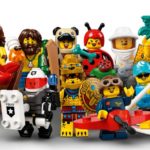Play leads to happiness, says LEGO Play Well report
The latest Play Well report from the LEGO Foundation has been published, using new research to demonstrate the importance of play in child development.
‘Leg Godt’, the phrase that inspired behind the company name ‘LEGO’, is known among fans of the brick to mean ‘play well’. Taking that as the title of an annual report, the LEGO Group conducts research and publishes findings about the importance of play in child development annually.
The 2018 report has been compiled by Dr Elena Hoicka – Senior Lecturer in Psychology in Education, Jessica Joelle Alexander – Parenting Expert, Dr Zhen Wu – Assistant Professor at the Department of Psychology at Tsinghua University and Research Lead at Tsinghua University Lifelong Learning Lab, China, Bo Stjerne Thomsen – Head of the LEGO Foundation Centre for Creativity, Play and Learning and Edelman Intelligence, an Independent Research Agency.
According to the report’s findings, the more time families spend playing, the happier they are, with 88% of families who play for more than five hours a week considering themselves to be happy, while only 75% of those who spend less than five hours week playing saying they are happy. 61% of parents find themselves getting distracted when engaging in playtime, with both parents and children reporting they would like to play more.
“Playing together is a fundamental cornerstone of family life for children and parents alike. But with modern lifestyles busier than ever and so much emphasis on formal education and structured activities, it can be easy to forget to make time for it,” says Jessica Joelle Alexander, Family expert and author. “Given the positive effects it has on our wellbeing and happiness levels, family play should be the most important ‘homework’ of all.”
The LEGO Group has come up with ten principles to inspire families to ‘play well’:
1. Challenge your mindset
2. Encourage free play
3. Kickstart with physical play
4. Variety is key
5. Go with the flow
6. Think creativity over mess
7. Embrace mistakes
8. Be silly
9. Plan a family playdate – and keep it
10. Gamify chores
According to the report, parents are suspicious of digital play, considering traditional, imaginative play a better option for families. Children themselves see fewer boundaries between digital and physical play, combining both, which has influenced the products that the LEGO Group are developing.
The study did acknowledge that there is an “otherwise narrow body of research exploring the idea of fluid play in the lives of families around the world, we welcome more research and development”, suggesting that while children mixing digital and physical play is acknowledged, what it actually means in practice has yet to be fully explained.
LEGO products are available to buy at shop.LEGO.com.








